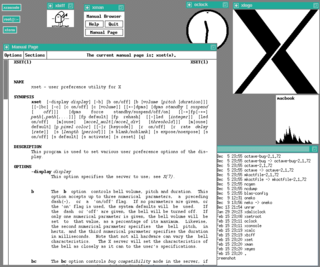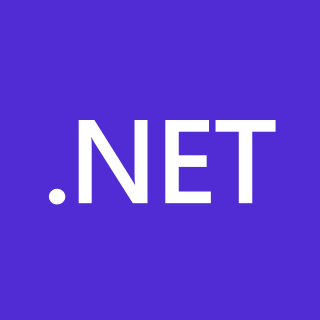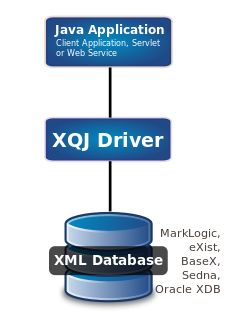The Common Language Infrastructure (CLI) is an open specification and technical standard originally developed by Microsoft and standardized by ISO/IEC and Ecma International that describes executable code and a runtime environment that allows multiple high-level languages to be used on different computer platforms without being rewritten for specific architectures. This implies it is platform agnostic. The .NET Framework, .NET and Mono are implementations of the CLI. The metadata format is also used to specify the API definitions exposed by the Windows Runtime.
SQL is a domain-specific language used in programming and designed for managing data held in a relational database management system (RDBMS), or for stream processing in a relational data stream management system (RDSMS). It is particularly useful in handling structured data, i.e. data incorporating relations among entities and variables.
The Single UNIX Specification (SUS) is a standard for computer operating systems, compliance with which is required to qualify for using the "UNIX" trademark. The standard specifies programming interfaces for the C language, a command-line shell, and user commands. The core specifications of the SUS known as Base Specifications are developed and maintained by the Austin Group, which is a joint working group of IEEE, ISO JTC 1 SC22 and The Open Group. If an operating system is submitted to The Open Group for certification, and passes conformance tests, then it is deemed to be compliant with a UNIX standard such as UNIX 98 or UNIX 03.

macOS Server, formerly Mac OS X Server and OS X Server, is a discontinued series of Unix-like server operating systems developed by Apple Inc., based on macOS and later add-on software packages for the latter. macOS Server added server functionality and system administration tools to macOS and provided tools to manage both macOS-based computers and iOS-based devices.
In computing, Open Database Connectivity (ODBC) is a standard application programming interface (API) for accessing database management systems (DBMS). The designers of ODBC aimed to make it independent of database systems and operating systems. An application written using ODBC can be ported to other platforms, both on the client and server side, with few changes to the data access code.
The Call Level Interface (CLI) is an application programming interface (API) and software standard to embed Structured Query Language (SQL) code in a host program as defined in a joint standard by the International Organization for Standardization (ISO) and International Electrotechnical Commission (IEC): ISO/IEC 9075-3:2003. The Call Level Interface defines how a program should send SQL queries to the database management system (DBMS) and how the returned recordsets should be handled by the application in a consistent way. Developed in the early 1990s, the API was defined only for the programming languages C and COBOL.
X/Open group was a consortium founded by several European UNIX systems manufacturers in 1984 to identify and promote open standards in the field of information technology. More specifically, the original aim was to define a single specification for operating systems derived from UNIX, to increase the interoperability of applications and reduce the cost of porting software. Its original members were Bull, ICL, Siemens, Olivetti, and Nixdorf—a group sometimes referred to as BISON. Philips and Ericsson joined in 1985, at which point the name X/Open was adopted.

Hierarchical Data Format (HDF) is a set of file formats designed to store and organize large amounts of data. Originally developed at the U.S. National Center for Supercomputing Applications, it is supported by The HDF Group, a non-profit corporation whose mission is to ensure continued development of HDF5 technologies and the continued accessibility of data stored in HDF.
SQL-92 was the third revision of the SQL database query language. Unlike SQL-89, it was a major revision of the standard. Aside from a few minor incompatibilities, the SQL-89 standard is forward-compatible with SQL-92.

In computing, a shell is a computer program that exposes an operating system's services to a human user or other programs. In general, operating system shells use either a command-line interface (CLI) or graphical user interface (GUI), depending on a computer's role and particular operation. It is named a shell because it is the outermost layer around the operating system.

C# is a general-purpose, multi-paradigm programming language. C# encompasses static typing, strong typing, lexically scoped, imperative, declarative, functional, generic, object-oriented (class-based), and component-oriented programming disciplines.
Simple Features is a set of standards that specify a common storage and access model of geographic feature made of mostly two-dimensional geometries used by geographic information systems. It is formalized by both the Open Geospatial Consortium (OGC) and the International Organization for Standardization (ISO).
The SQL/CLI, or Call-Level Interface, is an extension to the SQL standard is defined in SQL:1999, but also available in later editions such as ISO/IEC 9075-3:2003. This extension defines common interfacing components that can be used to execute SQL statements from applications written in other programming languages. The SQL/CLI extension is defined in such a way that SQL statements and SQL/CLI procedure calls are treated as separate from the calling application's source code.

The .NET Framework is a proprietary software framework developed by Microsoft that runs primarily on Microsoft Windows. It was the predominant implementation of the Common Language Infrastructure (CLI) until being superseded by the cross-platform .NET project. It includes a large class library called Framework Class Library (FCL) and provides language interoperability across several programming languages. Programs written for .NET Framework execute in a software environment named the Common Language Runtime (CLR). The CLR is an application virtual machine that provides services such as security, memory management, and exception handling. As such, computer code written using .NET Framework is called "managed code". FCL and CLR together constitute the .NET Framework.
CLI may refer to:

XQuery API for Java (XQJ) refers to the common Java API for the W3C XQuery 1.0 specification.

Mono is a free and open-source .NET Framework-compatible software framework. Originally by Ximian, it was later acquired by Novell, and is now being led by Xamarin, a subsidiary of Microsoft and the .NET Foundation. Mono can be run on many software systems.
PL/SQL is Oracle Corporation's procedural extension for SQL and the Oracle relational database. PL/SQL is available in Oracle Database, Times Ten in-memory database, and IBM Db2. Oracle Corporation usually extends PL/SQL functionality with each successive release of the Oracle Database.
The following outline is provided as an overview of and topical guide to C++:

ProFTPD is an FTP server. ProFTPD is Free and open-source software, compatible with Unix-like systems and Microsoft Windows . Along with vsftpd and Pure-FTPd, ProFTPD is among the most popular FTP servers in Unix-like environments today. Compared to those, which focus e.g. on simplicity, speed or security, ProFTPD's primary design goal is to be a highly feature rich FTP server, exposing a large amount of configuration options to the user.